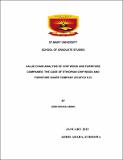| dc.description.abstract | This study was aimed at analyzing value chain of chip wood product at Ethiopian chip wood and furniture share company (ECAFCO S.C) with specific objectives of assessing the economic gain of the company out of the value chain network, analyze the reliability in relation to product deliveries, and identify the challenges and opportunities within the value chain of the study area. The data were collected from both primary and secondary sources. The primary data for this study were collected from 164 respondents through application of appropriate procedures. The study result showed that the company faced with decline in productivity of the machine, inconsistency of production volume, inconsistency of sales revenue and net profit. There is also inefficiency on man power side. The value chain analysis revealed that the Company is faced with lack of logistics (inbound logistics) to transport log promptly as per plan and this causes mismanagement of the stock. Concerning delivery of raw materials from international market, there is variation in raw material delivery time schedule the analysis showed that the major actors in chip wood value chain are suppliers, producers, retailers, contractors, builders and consumers. The result of correlation indicated that the selling price of chip wood board is highly affected by impulsive increase in cost of purchasing raw materials. The result of the survey showed that, value chain practices at study area had economic contribution which is being distributed among various components. It was found that the local residents have been complaining of the pollution from dust particles being released from the factory. it was found that value chain created market opportunity at study area. The result indicated that, the company does not have predetermined time schedule for maintaining machine. The analysis also showed that thecompany does not conduct market survey that may help the company know its position in terms of market share, core competency, weakness, in comparison to its competitors. Therefore, effort aiming at increasing investment in technology, employees ’ efficiency, efficiency of logistics, and decrease wastage of time due to variation in raw material delivery time schedule, periodic market survey, and environmentally suitable alternative location to replant the factory are recommended to accelerate the chains practices and development. | en |


